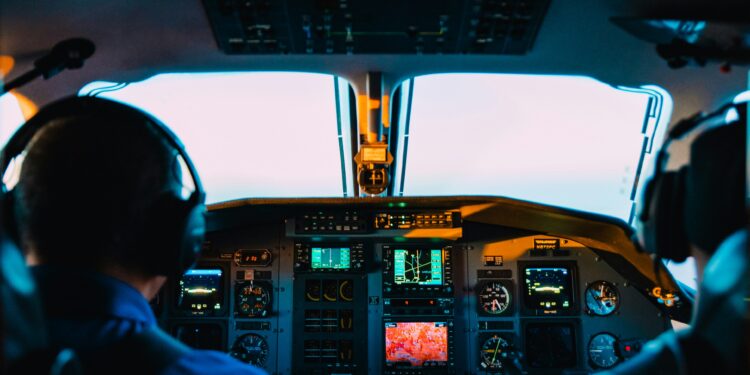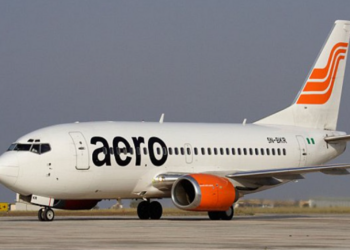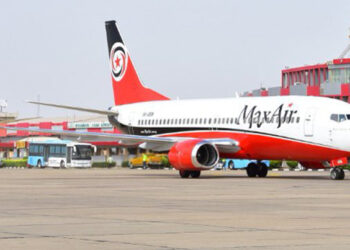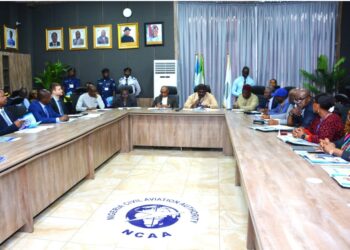For many Nigerians, the dream of becoming a pilot starts with a simple gaze toward the sky.
Maybe it’s the sight of a plane streaking across the horizon or the allure of exploring the world from above.
But how does one transform this childhood fascination into a reality, particularly in Nigeria, where the aviation industry is both promising and challenging?
Becoming a pilot in Nigeria is not merely about learning how to fly; it’s a journey that demands rigorous training, significant financial investment, and unwavering commitment.
Nairametrics spoke to stakeholders in the aviation sector, including practicing pilots to get an understanding of what it takes to be a pilot in Nigeria.
This article provides useful insights into the essential steps, the institutions involved, and what you can expect once you’re licensed to take to the skies.
A brief overview of commercial aviation’s evolution
Before diving into the specifics of pilot training in Nigeria, it’s crucial to understand how the global aviation landscape shaped local practices.
- The standardization of aviation began in earnest after World War II, with nations coming together to ensure uniform safety and operational protocols.
- The Chicago Convention of 1944 was a watershed moment, establishing the International Civil Aviation Organization (ICAO), which laid down the rules that would govern civil aviation globally.
- In Nigeria, these international standards are enforced by the Nigeria Civil Aviation Authority (NCAA), which was empowered by the Civil Aviation Act.
This body ensures that all aspects of aviation, including pilot training, adhere to the global norms established by ICAO. The NCAA’s rigorous oversight guarantees that pilot training in Nigeria meets the high standards expected worldwide.
Where Can You Train to Be a Pilot in Nigeria?
Currently, three institutions in Nigeria have the NCAA’s approval to offer pilot training:
- Nigerian College of Aviation Technology (NCAT) in Zaria, Kaduna State
- International Aviation College (IAC) in Ilorin, Kwara State
- International Helicopter Flying School in Emene, Enugu State
NCAT and IAC offer primary pilot training for airplanes, while the International Helicopter Flying School specializes in helicopter pilot training.
- The NCAA has authorized these institutions to offer specific courses based on their compliance with rigorous requirements set by the authority.
- The NCAA conducts routine surveillance of these training institutions to ensure continuous compliance with standards and strict adherence to regulations.
- Each of these institutions has undergone a stringent certification process to ensure they meet the necessary requirements for training future pilots.
Whether you’re looking to pilot airplanes or helicopters, these schools provide the foundational education and hands-on experience required to launch your career.
The Steps to Enroll in a Nigerian Pilot Training School
The journey to becoming a pilot in Nigeria begins with meeting the academic prerequisites: a minimum of five O’level credits, including English, Mathematics, and Physics.
Depending on the institution, you must be at least 17 or 18 years old to apply.
- Prospective pilots must pass several screening stages, including a general knowledge aptitude test, an aviation-specific assessment (covering aerodynamics, navigation, and meteorology), a coordination test, and a simulator flight test.
- Additionally, a comprehensive medical examination is required to ensure candidates are physically and mentally fit for the demands of pilot training.
- Those who pass these rigorous assessments are then eligible to enroll in an NCAA-approved training institution.
What Does Pilot Training in Nigeria Involve?
Pilot training in Nigeria is divided into several phases;
Ground School: Here, students learn the theoretical aspects of aviation, including principles of flight, aerodynamics, meteorology, aircraft systems, and aviation law. They also study human factors, safety protocols, and the regulations governing both national and international aviation.
Flight Training: This practical phase includes basic maneuvers like takeoff and landing, as well as more advanced skills like navigation and emergency procedures. Communication with air traffic control is also a critical component of this training.
Simulator Training: In simulators, students can safely practice handling complex flight scenarios, preparing them for real-life situations that might be too dangerous to attempt in an actual aircraft.
Solo Flight and Advanced Training: After sufficient dual instruction, students undertake solo flights, building their confidence and proficiency. Advanced training includes earning a Multi-Engine Rating and an Instrument Rating, which are essential for commercial flying.
Upon completing these stages, students earn a Private Pilot License (PPL), which can be upgraded to a Commercial Pilot License (CPL) with further training.
Captain Anthony Ayeni of Ibom Air, who has over 10 years of experience in the aviation industry, described the progression of flight training: “Flight training is intense.
After mastering the basics with an instructor, students must progress to solo flights, which are a major milestone. The first solo flight is unforgettable—it’s a mix of exhilaration and responsibility because that’s when you realize you’re truly on your own in the cockpit.”
The Cost of Training to Be a Pilot in Nigeria
Pilot training in Nigeria is a significant financial investment. The cost varies by institution:
- Nigerian College of Aviation Technology (NCAT): Approximately N23 million, with an option to pay in installments.
- International Aviation College (IAC): Around N28 million.
- International Helicopter Flying School: Pricing details are less clear, but similar costs can be expected.
These fees cover the entirety of the training program, though additional costs for type rating and other certifications may arise later in your career.
Captain Ayeni noted the financial burden of training: “Pilot training is expensive everywhere in the world, but in Nigeria, it’s particularly daunting because of the limited number of training institutions.
The high cost is a barrier for many aspiring pilots. It’s not just the tuition fees—you also have to consider the cost of living during training, and sometimes, additional costs like type rating, which can add another $15,000 to $60,000 to your expenses.”
Getting Licensed: The Final Step
After completing the required flight hours and passing all necessary exams, students can apply for a pilot license.
Once training is complete, your institution will notify the NCAA, which oversees the final licensing examination.
This exam includes a theoretical test and a practical flying assessment. Successful candidates receive their NCAA license, marking the official start of their aviation careers.
The initial licensing fees are relatively modest—N30,000 for most licenses, with additional fees for ratings or conversions of foreign licenses.
Captain Tijo elaborated on the licensing process:
“After completing training at any of the three NCAA-approved pilot training organizations, the institution notifies the Nigeria Civil Aviation Authority (NCAA) to begin the process of pilot licensing. Before a pilot can be officially licensed with a Private Pilot License (PPL) or Commercial Pilot License (CPL), the NCAA conducts a final licensing examination. This examination includes both a theoretical component—a computer-based multiple-choice test—and a practical component involving the operation of an aircraft. The pilot must successfully pass both parts of the examination to receive the NCAA license.”
What Happens After Training? The Path to Employment
After successfully obtaining a license, the next step is to seek employment. Newly licensed pilots typically have between 300 to 500 flight hours, which qualifies them for entry-level positions such as a first officer (co-pilot) with commercial airlines, private jet charter companies, or helicopter services.
However, employment opportunities are highly competitive, and additional type rating training is often required. Type rating qualifies a pilot to operate a specific type of aircraft and is essential for employment. This training is expensive and is often conducted outside Nigeria, depending on the aircraft type and the course duration.
Due to the substantial cost of type rating, airlines and private jet charter services usually require pilots to sign a bond, committing them to the company for a certain period. This bond ensures that the training investment can be recouped over time through the pilot’s service.
Specialized training, such as type rating for specific aircraft, is often required and can cost anywhere from $15,000 to $60,000 as stated earlier. This expense is usually borne by the airline, but many require pilots to sign a bond, committing to work for the company for a certain period to offset this investment.
How Much Can a New Pilot Expect to Earn in Nigeria?
Starting salaries for newly licensed pilots in Nigeria vary depending on the employer and the type of aircraft operated:
- Private Jet Companies: Around N1.5 million per month.
- Commercial Airlines: Between N1.5 million to N2.5 million per month, depending on the airline and the type of aircraft.
However, pilots whose type rating was financed by their employer may see periodic deductions from their salary to repay the training costs.
These figures can fluctuate based on factors such as the specific airline, aircraft type, and the pilot’s contract terms. It’s also important to note that if the employer financed the type rating, there might be salary deductions to repay this cost.
Wisdom Eseme Ntoto, the accountable manager of JetLyfe, a private jet charter company, provided insights into the remuneration in the private sector:
“New pilots employed by private jet charter companies like JetLyfe can expect to earn around N1.5 million per month. This salary reflects the specialized nature of private jet operations, where pilots often handle more customized and exclusive flights.”
In the commercial airline sector, Captain Ayeni provided a broader range for new pilot salaries:
“First officers, or co-pilots, in commercial airlines in Nigeria typically earn between N1.5 million to N2.5 million per month. The exact figure depends on various factors, including the specific airline, the aircraft type, and the pilot’s contract terms.”
The Reality of Being a Pilot in Nigeria
While the career of a pilot can seem glamorous, it is also highly demanding. Captain Anthony Ayeni of Ibom Air, emphasizes the commitment required:
“Being a pilot is one of the most tasking jobs there is. It’s not just about flying; it demands a high level of discipline, continuous study, and regular medical exams to ensure you’re fit to fly.”
Ayeni also points out that not every trained pilot lands a flying job immediately. “Despite the rigorous training and qualifications, not everyone may secure a flying job right away. But there are other career paths within aviation, like becoming a flight instructor or engaging in critical administrative roles.”
These alternative roles, Ayeni notes, keep pilots connected to the industry and can even lead to future flying opportunities. “These roles keep you connected to the industry, and who knows, they might lead to flying opportunities down the line,” he remarked.
Wisdom Eseme Ntoto, the accountable manager of JetLyfe, a private jet charter company, provides a perspective on salaries:
“New pilots employed by private jet charter companies like JetLyfe can expect to earn around N1.5 million per month. This reflects the specialized nature of private jet operations, where pilots often handle more customized and exclusive flights.”
In the commercial airline sector, Ayeni adds, “First officers, or co-pilots, in Nigeria typically earn between N1.5 million to N2.5 million per month, depending on the airline and other factors.”
Becoming a pilot in Nigeria is a journey that requires passion, commitment, and significant investment.
But for those willing to take the leap, the rewards—both personal and financial—can be substantial.
Whether you’re looking to command commercial airliners or explore the skies in a private jet, Nigeria’s aviation industry offers a pathway to turn your dreams into reality.
Note: This article is intended for informational purposes only and does not serve as official guidelines or comprehensive instructions for becoming a pilot in Nigeria. The content may not capture all the steps and actual cost required or cover them in full detail. Prospective pilots are strongly advised to conduct their own extensive research and consult with relevant authorities or institutions to obtain accurate and up-to-date information.























